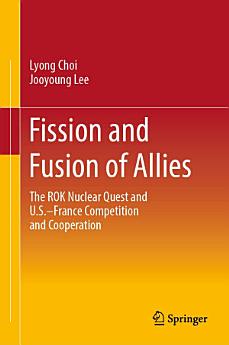Fission and Fusion of Allies: The ROK Nuclear Quest and U.S.–France Competition and Cooperation
Lyong Choi · Jooyoung Lee
Mar 2023 · Springer Nature
Ebook
110
Pages
reportRatings and reviews aren’t verified Learn More
About this ebook
This book traces the development of U.S-led global nuclear non-proliferation diplomacy during the three decades since the Eisenhower’s “Atoms for Peace” in 1953. The U.S. non-proliferation efforts had diverse obstacles. It had to prevent nuclear states’ export of nuclear technology while dissuading non-nuclear states from developing nuclear weapons. In addition, building non-proliferation regime was not always its top foreign policy priority. To understand the complex process of non-proliferation, the book examines the relations among three different actors in the nuclear field: a global non-proliferation regime builder (U.S.), a potential nuclear proliferator (France) and a would-be nuclear state (Republic of Korea). In tracing how they developed nuclear strategies, conflicting and compromising with one another, the book pays special attention to how the transforming Cold War structure in the 1970s not only affected foreign policies of the involved countries but also complicated theirrelationship. The exploration ultimately highlights the multidimensional nature of international discussion on nuclear non-proliferation as the ROK’s nuclear development attempts, U.S. non-proliferation efforts, and the U.S.-France nuclear technology cooperation in the 1970s were all deeply connected.
About the author
Lyong Choi is Associate Professor of the Asia-Pacific Research Center at Hanyang University. He was Associate Professor of Political Science and Sociology at the Korea Military Academy when this book was written. He obtained a Ph.D. in international history from the London School of Economics and Political Science. His research focuses on issues of modern and contemporary American, East Asian, and Korean history. He published “Human Rights, Popular Protest and Jimmy Carter’s Plan to Withdraw U.S. Troops from South Korea” for Diplomatic History in 2017, “North Korea and Zimbabwe, 1978–1982: from the strategic alliance to the symbolic comradeship between Kim Il Sung and Robert Mugabe” in 2017 and “Re-thinking Normalization between ROK and PRC in the Early 1990s: The South Korean Perspective” in 2014, and “The First Nuclear Crisis in the Korean Peninsula, 1975- 76,” in 2013 for Journal of Cold War History.
Jooyoung Lee (Ph.D., History, Brown University) is anAssistant Professor in the School of Liberal Arts at Ulsan National Institute of Science and Technology in South Korea. His research topics include the histories of U.S. democracy promotion, transnational human rights politics, and international nuclear diplomacy. He is particularly interested in examining the roles that various ideas such as democracy, human rights, liberalism have played in international relations. He also considers U.S. diplomacy in the global context by paying attention to how U.S. policy has been constrained on the stage of international relations and how the U.S. has tried to overcome these constraints. He has published articles in Interventions, Diplomatic History, Journal of American-East Asian Relations as well as in several Korean history journals.
Jooyoung Lee (Ph.D., History, Brown University) is anAssistant Professor in the School of Liberal Arts at Ulsan National Institute of Science and Technology in South Korea. His research topics include the histories of U.S. democracy promotion, transnational human rights politics, and international nuclear diplomacy. He is particularly interested in examining the roles that various ideas such as democracy, human rights, liberalism have played in international relations. He also considers U.S. diplomacy in the global context by paying attention to how U.S. policy has been constrained on the stage of international relations and how the U.S. has tried to overcome these constraints. He has published articles in Interventions, Diplomatic History, Journal of American-East Asian Relations as well as in several Korean history journals.
Rate this ebook
Tell us what you think.
Reading information
Smartphones and tablets
Install the Google Play Books app for Android and iPad/iPhone. It syncs automatically with your account and allows you to read online or offline wherever you are.
Laptops and computers
You can listen to audiobooks purchased on Google Play using your computer's web browser.
eReaders and other devices
To read on e-ink devices like Kobo eReaders, you'll need to download a file and transfer it to your device. Follow the detailed Help Center instructions to transfer the files to supported eReaders.




